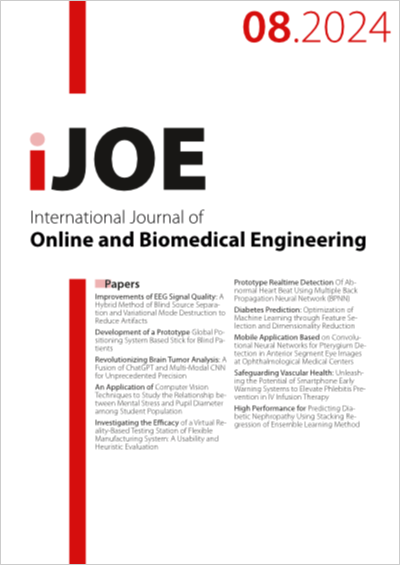Safeguarding Vascular Health: Unleashing the Potential of Smartphone Early Warning Systems to Elevate Phlebitis Prevention in IV Infusion Therapy
DOI:
https://doi.org/10.3991/ijoe.v20i08.48345Keywords:
Infusion, Early Warning System, Phlebitis, IoMT, Mobile TechnologyAbstract
Intravenous (IV) infusion is a pervasive medical intervention, administered to approximately 90% of hospitalized patients. Phlebitis, characterized by inflammation of the veins resulting from infusion, stands as a prevalent complication, ranking fourth among hospitalacquired infections globally. This research investigates the efficacy of a Smartphone Early Warning System (EWS) display in mitigating the incidence of phlebitis within the Safa treatment room at Aisyiyah Hospital. Employing a pre-experimental research design with a Static-group Comparison approach, 16 respondents were allocated to treatment and control groups. The Mann-Whitney Test, a statistical analysis, unveiled a significant difference (P Value = 0.001 < 0.05) in phlebitis incidence between the treatment group, utilizing the Smartphone EWS display, and the control group, which relied on conventional monitoring methods. Notably, the average rank of phlebitis incidence in the control group (21.12) exceeded that in the treatment group (9.78). This study sheds light on the potential of the Smartphone EWS display to curtail phlebitis during infusion, emphasizing its role in advancing nursing care quality through real-time monitoring and early prevention strategies.
Downloads
Published
How to Cite
Issue
Section
License
Copyright (c) 2024 Aulia Asman, Yulkifli, Yohandri, Naurah Nazhifah, Agariadne Dwinggo Samala, Soha Rawas

This work is licensed under a Creative Commons Attribution 4.0 International License.



